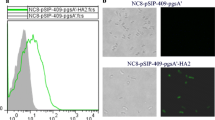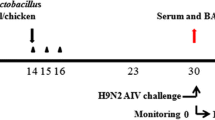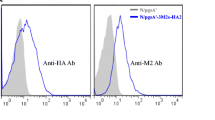Abstract
Avian leukosis, caused by avian leukosis virus (ALV), is an infectious tumor disease and severely hinders the development of the poultry industry. The use of Lactobacillus plantarum (L. plantarum) could effectively alleviate viremia in the early period of J subgroup ALV (ALV-J) infection. In this study, an invasive L. plantarum NC8 expressing Gp85 protein of ALV-J was constructed. After chickens were orally administered the recombinant invasive NC8, the levels of expression of CD4+ and CD8+ T lymphocytes in peripheral blood and spleen by flow cytometry and the proliferation ability of splenocytes by 3-(4,5-dimethylthiazol-2-yl)-2,5-diphenyltetrazolium bromide (MTT) assay were examined, and the contents of cytokines, the anti-ALV-J antibody in serum, and mucosal antibody sIgA in intestinal lavage fluid were detected by enzyme-linked immunosorbent assay (ELISA). The immunoprotective efficiency was evaluated by monitoring the infection rate, the percent of cloacal swabs and survival, body weight gain, the organ indexes, and relative virus loads after challenge with ALV-J. The results showed that the recombinant invasive strain (FnBPA-gp85) could promote the expression levels of the CD8+T cells in peripheral blood and spleen, the proliferation of splenocytes, the secretions of cytokines interleukin 2 (IL-2) and γ-interferon (IFN-γ), and the production of IgG and sIgA compared with the PBS and FnBPA control groups in chickens. The FnBPA-gp85 group was exhibited the highest immune protection against ALV-J infection. The above results indicated that the recombinant invasive NC8 could promote the cellular immunity, humoral immunity, and mucosal immunity responses in chicken and provide a new method for exploring the live vaccine against ALV-J.
Key points
• The FnBPA-gp85 strain could enhance cellular immunity response.
• The FnBPA-gp85 strain could improve the immune protection against ALV-J infection.






Similar content being viewed by others
Data Availability
The authors make a commitment of the authenticity and trustworthy datum.
References
Almeida JF, Breyner NM, Mahi M, Ahmed B, Benbouziane B, Boas PC, Miyoshi A, Azevedo V, Langella P, Bermudez-Humaran LG, Chatel JM (2016) Expression of fibronectin binding protein A (FnBPA) from Staphylococcus aureus at the cell surface of Lactococcus lactis improves its immunomodulatory properties when used as protein delivery vector. Vaccine 34(10):1312–1328. https://doi.org/10.1016/j.vaccine.2016.01.022
Almeida JF, Mariat D, Azevedo V, Miyoshi A, de Moreno de LeBlanc A, Del Carmen S, Martin R, Langella P, LeBlanc JG, Chatel JM (2014) Correlation between fibronectin binding protein A expression level at the surface of recombinant Lactococcuslactis and plasmid transfer in vitro and in vivo. BMC Microbiol 14:248. https://doi.org/10.1186/s12866-014-0248-9
Arena MP, Capozzi V, Spano G, Fiocco D (2017) The potential of lactic acid bacteria to colonize biotic and abiotic surfaces and the investigation of their interactions and mechanisms. Appl Microbiol Biotechnol 101(7):2641–2657. https://doi.org/10.1007/s00253-017-8182-z
Blake DP, Tomley FM (2014) Securing poultry production from the ever-present Eimeria challenge. Trends Parasitol 30(1):12–19. https://doi.org/10.1016/j.pt.2013.10.003
Chai N, Bates P (2006) Na+/H+ exchanger type 1 is a receptor for pathogenic subgroup J avian leukosis virus. Proc Natl Acad Sci U S A 103(14):5531–5536. https://doi.org/10.1073/pnas.0509785103
Chen X, Wang H, Fang X, Gao K, Fang C, Gu Y, Gao Y, Wang X, Huang H, Liang X, Yang Y (2020) Identification of a novel epitope specific for Gp85 protein of avian leukosis virus subgroup K. Vet Immunol Immunopathol 230:110143. https://doi.org/10.1016/j.vetimm.2020.110143
Cheng J, Wen S, Wang S, Hao P, Cheng Z, Liu Y, Zhao P, Liu J (2017) gp85 protein vaccine adjuvanted with silica nanoparticles against ALV-J in chickens. Vaccine 35(2):293–298. https://doi.org/10.1016/j.vaccine.2016.11.077
Cross ML (2002) Microbes versus microbes: immune signals generated by probiotic Lactobacilli and their role in protection against microbial pathogens. FEMS Immunol Med Microbiol 34(4):245–253. https://doi.org/10.1111/j.1574-695X.2002.tb00632.x
Cai R, Jiang Y, Yang W, Yang W, Shi S, Shi C, Hu J, Gu W, Ye L, Zhou F, Gong Q, Han W, Yang G, Wang C (2016) Surface-displayed IL-10 by recombinant Lactobacillus plantarum reduces Th1 responses of RAW264.7 cells stimulated with Poly(I:C) or LPS. J Microbiol Biotechnol 26(2):421–431. https://doi.org/10.4014/jmb.1509.09030
Dai M, Wu S, Feng M, Feng S, Sun C, Bai D, Gu M, Liao M, Cao W (2016) Recombinant chicken interferon-alpha inhibits the replication of exogenous avian leukosis virus (ALV) in DF-1 cells. Mol Immunol 76:62–69. https://doi.org/10.1016/j.molimm.2016.06.012
Dai Z, Huang J, Lei X, Yan Y, Lu P, Zhang H, Lin W, Chen W, Ma J, Xie Q (2017) Efficacy of an autophagy-targeted DNA vaccine against avian leukosis virus subgroup. J Vaccine 35(5):808–813. https://doi.org/10.1016/j.vaccine.2016.12.034
Dong X, Ju S, Zhao P, Li Y, Meng F, Sun P, Cui Z (2014) Synergetic effects of subgroup J avian leukosis virus and reticuloendotheliosis virus co-infection on growth retardation and immunosuppression in SPF chickens. Vet Microbiol 172(3–4):425–431. https://doi.org/10.1016/j.vetmic.2014.06.025
Dong X, Zhao P, Chang S, Ju S, Li Y, Meng F, Sun P, Cui Z (2015) Synergistic pathogenic effects of co-infection of subgroup J avian leukosis virus and reticuloendotheliosis virus in broiler chickens. Avian Pathol 44(1):43–49. https://doi.org/10.1080/03079457.2014.993359
Feng M, Zhang N, Xie T, Ren F, Cao Z, Zeng X, Swevers L, Zhang X, Sun J (2019) Chichen type III interferon produced by silkworm bioreactor induces ISG expression and restricts ALV-J infection in vitro. Appl Microbiol Biotechnol 103(20):8473–8483. https://doi.org/10.1007/s00253-019-10090-z
Feng M, Zhang X (2016) Immunity to Avian Leukosis Virus: Where are we now and what should we do? Front Immunol 7:624. https://doi.org/10.3389/fimmu.2016.00624
Izuddin WI, Loh TC, Foo HL, Samsudin AA, Humam AM (2019) Postbiotic L. plantarum RG14 improves ruminal epithelium growth, immune status and upregulates the intestinal barrier function in post-weaning lambs. Sci Rep 9(1):9938. https://doi.org/10.1038/s41598-019-46076-0
Li B, Wei K, Yang S, Yang Y, Zhang Y, Zhu F, Wang D, Zhu R (2015) Immunomodulatory effects of Taishan Pinus massoniana pollen polysaccharide and propolis on immunosuppressed chickens. Microb Pathog 78:7–13. https://doi.org/10.1016/j.micpath.2014.11.010
Liang X, Gu Y, Chen X, Li T, Gao Y, Wang X, Fang C, Fang S, Yang Y (2019) Identification and characterization of a novel natural recombinant avian leucosis virus from Chinese indigenous chicken flock. Virus Genes 55(5):726–733. https://doi.org/10.1007/s11262-019-01695-7
Liang XY (2018) Biological Characteristics of the Isolates of Avian Leukosis Virus Subgroup A and K Associated with Myeloid Avian Leukosis. Dissertation, Yangtze University
Liu J, Yang G, Gao X, Zhang Z, Liu Y, Liu Q, Chatel JM, Jiang Y, Wang C (2019) Recombinant invasive Lactobacillus plantarum expressing fibronectin binding protein A induce specific humoral immune response by stimulating differentiation of dendritic cells. Benef Microbes 10(5):589–604. https://doi.org/10.3920/BM2018.0157
Liu Y, Jiang YL, Liu J, Gao X, Zhang Z, Huang HB, Yang WT, Shi CW, Cao X, Yang GL, Wang CF (2020) Recombinant invasive Lactobacillus plantarum expressing the Eimeria tenella fusion gene TA4 and AMA1 induces protection against coccidiosis in chickens. Vet Parasitol 283:109161. https://doi.org/10.1016/j.vetpar.2020.109161
Li YS (2015) Screening and Application of ALV-B Monoclonal Antibodies. Dissertation, Shandong Agricultural University
Reddy AS, Golovkin MV (2008) Current topics in microbiology and immunology Nuclear pre-mRNA processing in plants Preface. Curr Top Microbiol Immunol 326(13):235–555. https://doi.org/10.1007/978-3-540-76776-3
Seegers JF (2002) Lactobacilli as live vaccine delivery vectors: progress and prospects. Trends Biotechnol 20(12):508–515. https://doi.org/10.1016/s0167-7799(02)02075-9
Shao H, Wang L, Sang J, Li T, Liu Y, Wan Z, Qian K, Qin A, Ye J (2017) Novel avian leukosis viruses from domestic chicken breeds in mainland China. Arch Virol 162(7):2073–2076. https://doi.org/10.1007/s00705-017-3344-y
Sorvig E, Mathiesen G, Naterstad K, Eijsink VG, Axelsson L (2005) High-level, inducible gene expression in Lactobacillus sakei and Lactobacillus plantarum using versatile expression vectors. Microbiology 151(Pt 7):2439–2449. https://doi.org/10.1099/mic.0.28084-0
Su GH, Zhang YY, Xiao BN, Yan HF, Deng Y (2007) Improvement of blood conservation condation and DNA extraction method from blood in dairy cattle. Chin Dairy Cows 5:7–9
Wang F, Wang X, Chen H, Liu J, Cheng Z (2011) The critical time of avian leukosis virus subgroup J-mediated immunosuppression during early stage infection in specific pathogen-free chickens. J Vet Sci 12(3):235–241. https://doi.org/10.4142/jvs.2011.12.3.235
Wang J, Jiang H, Yang R, Zhang S, Zhao W, Hu J, Jiang Y, Yang W, Huang H, Shi C, Yang G, Wang H, Wang C, Feng N (2020) Construction and evaluation of recombinant Lactobacillus plantarum NC8 delivering one single or two copies of G protein fused with a DC-targeting peptide (DCpep) as novel oral rabies vaccine. Vet Microbiol 251:108906. https://doi.org/10.1016/j.vetmic.2020.108906
Wang S, Geng N, Zhou D, Qu Y, Shi M, Xu Y, Liu K, Liu Y, Liu J (2019) Oral Immunization of Chickens With Recombinant Lactobacillus plantarum Vaccine Against Early ALV-J Infection. Front Immunol 10:2299. https://doi.org/10.3389/fimmu.2019.02299
Wang Y, Wang G, Wang Z, Zhang H, Zhang L, Cheng Z (2014) Chicken biliary exosomes enhance CD4(+) T proliferation and inhibit ALV-J replication in liver. Biochem Cell Biol 92(2):145–151. https://doi.org/10.1139/bcb-2013-0096
Wyszynska A, Kobierecka P, Bardowski J, Jagusztyn-Krynicka EK (2015) Lactic acid bacteria–20 years exploring their potential as live vectors for mucosal vaccination. Appl Microbiol Biotechnol 99(7):2967–2977. https://doi.org/10.1007/s00253-015-6498-0
Yang G, Yao J, Yang W, Jiang Y, Du J, Huang H, Gu W, Hu J, Ye L, Shi C, Shan B, Wang C (2017a) Construction and immunological evaluation of recombinant Lactobacillus plantarum expressing SO7 of Eimeria tenella fusion DC-targeting peptide. Vet Parasitol 236:7–13. https://doi.org/10.1016/j.vetpar.2017.01.023
Yang WT, Yang GL, Shi SH, Liu YY, Huang HB, Jiang YL, Wang JZ, Shi CW, Jing YB, Wang CF (2017b) Protection of chickens against H9N2 avian influenza virus challenge with recombinant Lactobacillus plantarum expressing conserved antigens. Appl Microbiol Biotechnol 101(11):4593–4603. https://doi.org/10.1007/s00253-017-8230-8
Yu C, Wei K, Liu L, Yang S, Hu L, Zhao P, Meng X, Shao M, Wang C, Zhu L, Zhang H, Li Y, Zhu R (2017) Taishan Pinus massoniana pollen polysaccharide inhibits subgroup J avian leucosis virus infection by directly blocking virus infection and improving immunity. Sci Rep 7:44353. https://doi.org/10.1038/srep44353
Zhang Z, Huang HB, Jiang YL, Liu J, Gao X, Liu Y, Yang WT, Shi CW, Wang D, Wang JZ, Kang YH, Wang CF, Yang GL (2020) Immunological evaluation of invasive Lactobacillus plantarum co-expressing EtMIC2 and chicken interleukin-18 against Eimeria tenella. Parasitol Res 119(9):2885–2895. https://doi.org/10.1007/s00436-020-06745-w
Funding
This work was supported by the National Natural Science Foundation of China (31972646) and Key Laboratory of Prevention and Control Agents for Animal Bacteriosis (Ministry of Agriculture and Rural Affairs) (KLPCAAB-2021–04).
Author information
Authors and Affiliations
Contributions
JL and YY conceived and designed research. JL, KG, DL, YZ, and XC conducted experiments. CW contributed the strains and plasmids. JL, KG, CF, XL, and YG analyzed data. KG wrote the manuscript and JL reviewed the manuscript. All authors read and approved the manuscript.
Corresponding author
Ethics declarations
Ethics approval
All applicable international, national, and/or institutional guidelines for the care and use of animals were followed (People’s Republic of China Ministry of Health, document NO. 55, 2001).
Conflict of interest
The authors declare no competing interests.
Additional information
Publisher's note
Springer Nature remains neutral with regard to jurisdictional claims in published maps and institutional affiliations.
Rights and permissions
About this article
Cite this article
Liu, J., Gao, K., Li, D. et al. Recombinant invasive Lactobacillus plantarum expressing the J subgroup avian leukosis virus Gp85 protein induces protection against avian leukosis in chickens. Appl Microbiol Biotechnol 106, 729–742 (2022). https://doi.org/10.1007/s00253-021-11699-9
Received:
Revised:
Accepted:
Published:
Issue Date:
DOI: https://doi.org/10.1007/s00253-021-11699-9




